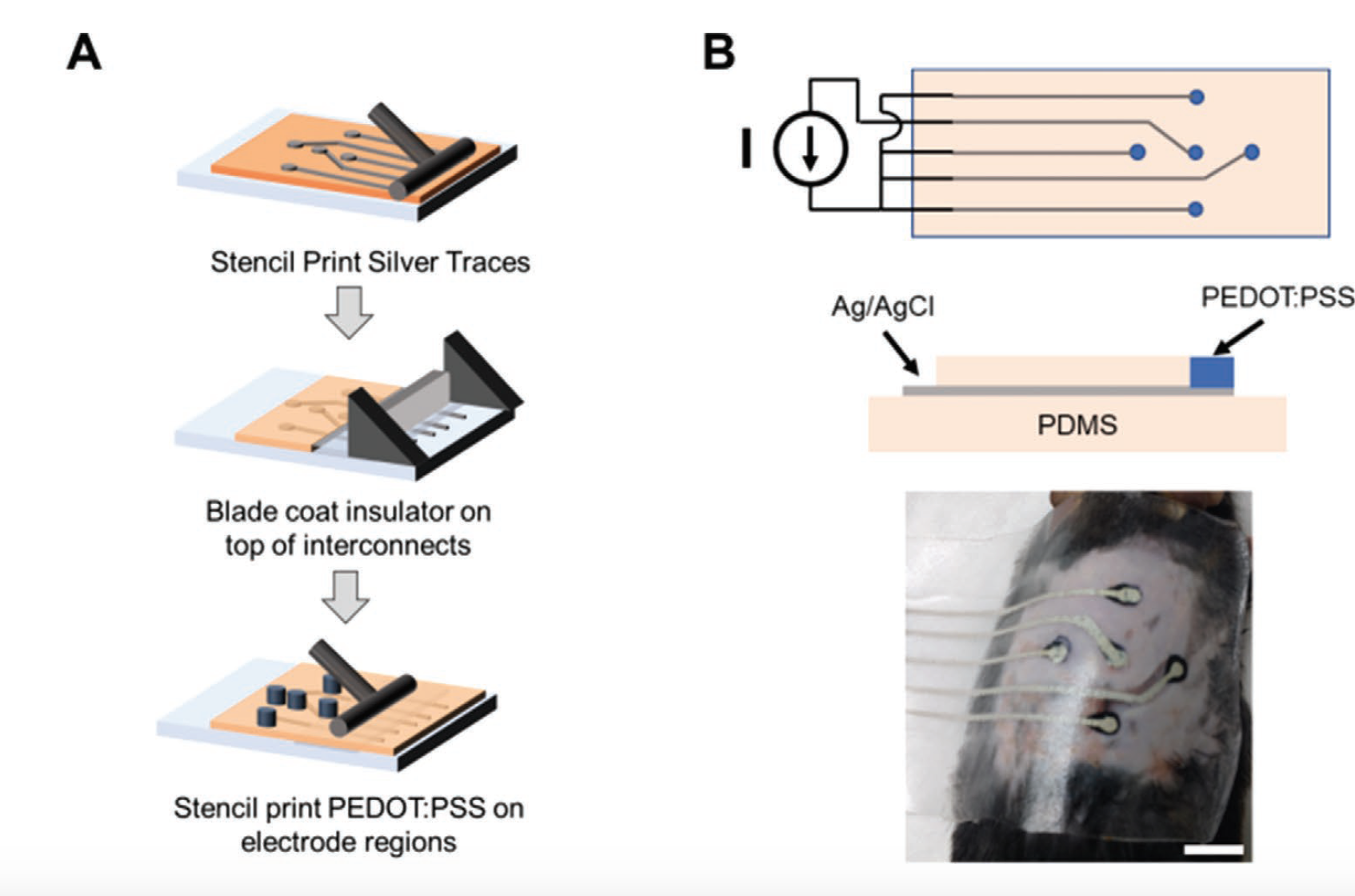Ting, Natasha, and Juan’s Paper in Advanced Biosystems. Congrats!!!
Paper title: A Platform to Study the Effects of Electrical Stimulation on Immune Cell Activation During Wound Healing
Abstract: Wound healing is a complex process involving diverse changes in multiple cell types where the application of electric fields has been shown to accelerate wound closure. To define the efficacy of therapies based on electric fields, it would be valuable to have a platform to systematically study the effects of electrical stimulation (ES) upon the inflammation phase and the activation of signaling mediators. Here, an in vivo ES model in which flexible electrodes are applied to an animal model for monitoring inflammation in a wound is reported on. Subcutaneous implants of polyvinyl alcohol sponges elicit inflammation response as defined by the infiltration of leukocytes. The wound site is subjected to electric fields using two types of additively fabricated flexible electrode arrays. The sponges are then harvested for flow cytometry analysis to identify changes in the phosphorylation state of intracellular targets. This platform enables studies of molecular mechanisms, as it shows that an application of low‐frequency ES ≤0.5 Hz increases phosphorylation of Erk proteins in recruited leukocytes, identifying a signaling pathway that is activated during the healing process.
Publication:
-

A Platform to Study the Effects of Electrical Stimulation on Immune Cell Activation During Wound Healing
Kaiping Wang,
Udit Parekh,
Jonathan K. Ting,
Natasha A. D. Yamamoto,
Juan Zhu,
Todd Costantini,
Ana Claudia Arias Aria,
Brian P. Eliceiri,
and
Tse Nga Ng
Advanced Biosystems,
2019
1900106.
[Abstract]
[Bibtex]
[PDF]
Wound healing is a complex process involving diverse changes in multiple cell types where the application of electric fields has been shown to accelerate wound closure. To define the efficacy of therapies based on electric fields, it would be valuable to have a platform to systematically study the effects of electrical stimulation (ES) upon the inflammation phase and the activation of signaling mediators. Here, an in vivo ES model in which flexible electrodes are applied to an animal model for monitoring inflammation in a wound is reported on. Subcutaneous implants of polyvinyl alcohol sponges elicit inflammation response as defined by the infiltration of leukocytes. The wound site is subjected to electric fields using two types of additively fabricated flexible electrode arrays. The sponges are then harvested for flow cytometry analysis to identify changes in the phosphorylation state of intracellular targets. This platform enables studies of molecular mechanisms, as it shows that an application of low‐frequency ES ≤0.5 Hz increases phosphorylation of Erk proteins in recruited leukocytes, identifying a signaling pathway that is activated during the healing process.
@article{Ting2019advancedbiosystems,
author = {Wang, Kaiping and Parekh, Udit and K. Ting, Jonathan and Yamamoto, Natasha A. D. and Zhu, Juan and Costantini, Todd and Aria, Ana Claudia Arias and Eliceiri, Brian P. and Ng, Tse Nga},
title = {A Platform to Study the Effects of Electrical Stimulation on Immune Cell Activation During Wound Healing},
year = {2019},
doi = {10.1002/adbi.201900106},
publisher = {Wiley Online Library},
url = {https://onlinelibrary.wiley.com/doi/abs/10.1002/adbi.201900106},
journal = {Advanced Biosystems},
number = {1900106},
thumbnail = {Ting2019advancedbiosystems.png},
pdf = {Ting2019advancedbiosystems.pdf}
}
 A Platform to Study the Effects of Electrical Stimulation on Immune Cell Activation During Wound Healing Advanced Biosystems, 2019 1900106. [Abstract] [Bibtex] [PDF]
A Platform to Study the Effects of Electrical Stimulation on Immune Cell Activation During Wound Healing Advanced Biosystems, 2019 1900106. [Abstract] [Bibtex] [PDF]